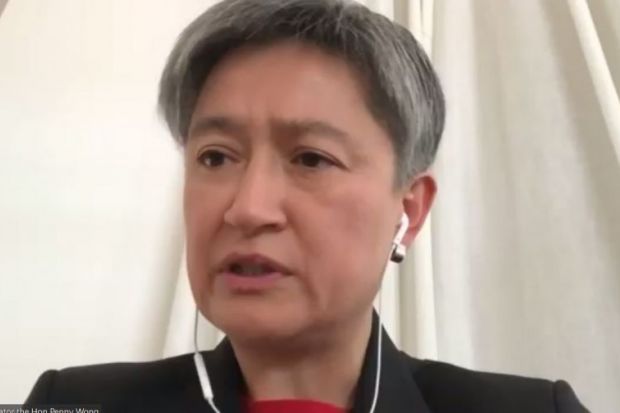Universities must navigate a “different phase” in their dealings with a China that is now willing to integrate trade with its geopolitical strategy, an Australian forum has heard.
Australia’s shadow foreign affairs minister, Penny Wong, said it was becoming increasingly difficult to draw distinctions between the policies of China’s government and the choices its people made as consumers.
“We are going through…a period of strategic competition that’s not been seen since World War Two,” Ms Wong told an international education summit hosted by the Australian Technology Network of universities. “This is…a work in progress.
“I doubt that the new normal will be like the old normal. I suspect we will have quite a different set of geopolitical and market conditions, and the way in which we relied on large numbers of international students may have to be rethought.”
Stephen Smith, international law professor at the University of Western Australia and Australia’s foreign minister between 2007 and 2010, said that his country’s relationship with China “will get worse before it gets better”.
Professor Smith said that a “changed” China under paramount leader Xi Jinping would no longer “brook a conversation” on matters it considered core interests, “let alone any negotiation”. But China is “not a monolith”, he stressed.
“It doesn’t make any sense for us to say [that] because that’s the approach of the Communist Party in China, we should cut all ties and not have conversations,” Professor Smith told the summit.
“If China decides for economic punishment reasons that Chinese students shouldn’t come to Australia, that’ll be the end of the matter. At the same time, we should do everything we can to have decent, simple and cordial relations to the extent that we can.”
He said there would always be families in large Asian countries such as China, India and Indonesia who wanted their children to be educated in other countries. “We will continue to see students come,” he said. “What the ultimate mix is, time will tell.”
Professor Smith’s predecessor as foreign minister, Alexander Downer, said that China’s frosty relations with Australia would not have “much impact at all” on Chinese people’s appetite for foreign degrees.
Mr Downer said that there was a “huge demand” among the middle class of China – along with India, Southeast Asia, Nigeria and elsewhere – for quality education in the English language. He said that enrolments would continue to flourish in Australia and the UK, where he is executive chair of the International School for Government at King’s College London.
The UK’s deteriorating relationship with China – demonstrated in “slanging matches” over issues such as Hong Kong and Huawei, and the Chinese ambassador’s “rather familiar blood-curdling sounds” about the British being “punished” – had not dampened Chinese people’s appetite for UK education, Mr Downer said.
“I have been amazed at the high level of enrolments that have continued in British universities from…China, in spite of the huge economic downturn,” he told the forum. “We have to distinguish between the hostility of the government and the attitude [of] the people.”
Register to continue
Why register?
- Registration is free and only takes a moment
- Once registered, you can read 3 articles a month
- Sign up for our newsletter
Subscribe
Or subscribe for unlimited access to:
- Unlimited access to news, views, insights & reviews
- Digital editions
- Digital access to THE’s university and college rankings analysis
Already registered or a current subscriber?








